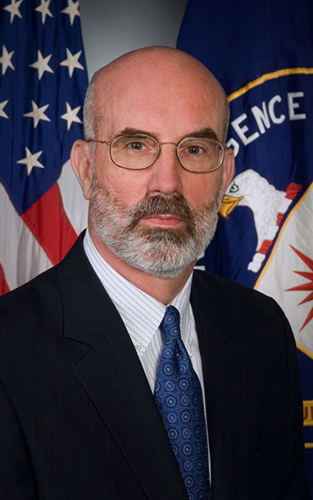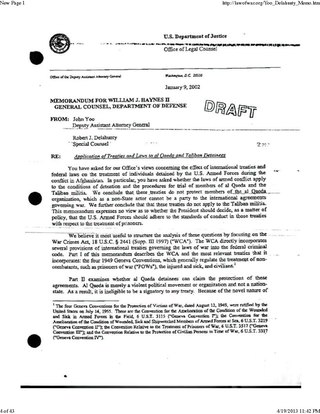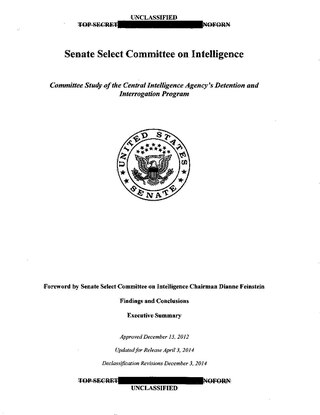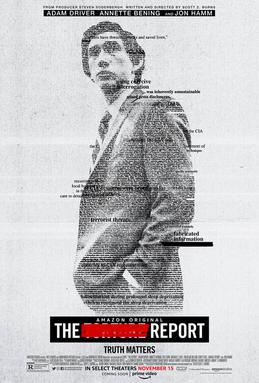Related Research Articles

Abu Zubaydah is a Palestinian citizen born in Saudi Arabia currently held by the U.S. in the Guantanamo Bay detention camp in Cuba. He is held under the authority of Authorization for Use of Military Force Against Terrorists (AUMF).

Waterboarding is a form of torture in which water is poured over a cloth covering the face and breathing passages of an immobilized captive, causing the person to experience the sensation of drowning. In the most common method of waterboarding, the captive's face is covered with cloth or some other thin material and immobilized on their back at an incline of 10 to 20 degrees. Torturers pour water onto the face over the breathing passages, causing an almost immediate gag reflex and creating a drowning sensation for the captive. Normally, water is poured intermittently to prevent death; however, if the water is poured uninterruptedly it will lead to death by asphyxia. Waterboarding can cause extreme pain, damage to lungs, brain damage from oxygen deprivation, other physical injuries including broken bones due to struggling against restraints, and lasting psychological damage. Adverse physical effects can last for months, and psychological effects for years. The term "water board torture" appeared in press reports as early as 1976.

Leon Edward Panetta is an American retired politician and government official who has served under several Democratic administrations as secretary of defense (2011–2013), director of the CIA (2009–2011), White House chief of staff (1994–1997), director of the Office of Management and Budget (1993–1994), as well as a U.S. representative from California (1977–1993).

Mustafa Ahmed Adam al-Hawsawi is a Saudi Arabian citizen. He is alleged to have acted as a key financial facilitator for the September 11 attacks in the United States.

Stephen R. Kappes was the Deputy Director of the Central Intelligence Agency (DDCIA), until his resignation on April 14, 2010. He had served in the CIA since 1981, with a two-year hiatus. A career clandestine operations professional, Kappes supervised the extraordinary rendition program, a non-judicial system of rendering persons suspected of terrorism to secret locations where most of them were interrogated. Kappes also helped persuade Libyan leader Muammar al-Gaddafi to abandon his nuclear weapons program in 2003. In 2009, Kappes was convicted in absentia by an Italian court for his headquarters-based role in the rendition and torture of an Egyptian citizen who was kidnapped from Italian soil by the CIA.

Mohammed Farik Bin Amin, alias Zubair Zaid, is a Malaysian who is alleged to be a senior member of Jemaah Islamiyah and al Qaeda. He is currently in American custody in the Guantanamo Bay detention camp. He is one of the 14 detainees who had previously been held for years at CIA black sites. In the ODNI biographies of those 14, Amin is described as a direct subordinate of Hambali. Farik Amin is also a cousin of well-known Malaysian terrorist Zulkifli Abdhir.
"Enhanced interrogation techniques" or "enhanced interrogation" was a program of systematic torture of detainees by the Central Intelligence Agency (CIA), the Defense Intelligence Agency (DIA) and various components of the U.S. Armed Forces at remote sites around the world—including Abu Ghraib, Bagram, Bucharest, and Guantanamo Bay—authorized by officials of the George W. Bush administration. Methods used included beating, binding in contorted stress positions, hooding, subjection to deafening noise, sleep disruption, sleep deprivation to the point of hallucination, deprivation of food, drink, and medical care for wounds, as well as waterboarding, walling, sexual humiliation, rape, sexual assault, subjection to extreme heat or extreme cold, and confinement in small coffin-like boxes. A Guantanamo inmate's drawings of some of these tortures, to which he himself was subjected, were published in The New York Times. Some of these techniques fall under the category known as "white room torture". Several detainees endured medically unnecessary "rectal rehydration", "rectal fluid resuscitation", and "rectal feeding". In addition to brutalizing detainees, there were threats to their families such as threats to harm children, and threats to sexually abuse or to cut the throat of detainees' mothers.

John Chris Kiriakou is an American author, journalist and former intelligence officer. Kiriakou is a columnist with Reader Supported News and co-host of Political Misfits on Sputnik Radio. He was jailed for exposing the interrogation techniques of the U.S. government.
The CIA interrogation videotapes destruction occurred on November 9, 2005. The videotapes were made by the United States Central Intelligence Agency (CIA) during interrogations of al-Qaeda suspects Abu Zubaydah and Abd al-Rahim al-Nashiri in 2002 at a CIA black site prison in Thailand. Ninety tapes were made of Zubaydah and two of al-Nashiri. Twelve tapes depict interrogations using "enhanced interrogation techniques", a euphemism for torture. The tapes and their destruction became public knowledge in December 2007. A criminal investigation by a Department of Justice special prosecutor, John Durham, decided in 2010 to not file any criminal charges related to destroying the videotapes.

Steven Gill Bradbury is an American lawyer and government official who served as the General Counsel of the United States Department of Transportation. He previously served as Acting Assistant Attorney General from 2005 to 2007 and Principal Deputy Assistant Attorney General from 2004 to 2009, heading the Office of Legal Counsel (OLC) in the U.S. Department of Justice during President George W. Bush's second term.

A set of legal memoranda known as the "Torture Memos" were drafted by John Yoo as Deputy Assistant Attorney General of the United States and signed in August 2002 by Assistant Attorney General Jay S. Bybee, head of the Office of Legal Counsel of the United States Department of Justice. They advised the Central Intelligence Agency, the United States Department of Defense, and the president on the use of enhanced interrogation techniques—mental and physical torment and coercion such as prolonged sleep deprivation, binding in stress positions, and waterboarding—and stated that such acts, widely regarded as torture, might be legally permissible under an expansive interpretation of presidential authority during the "War on Terror."

John Anthony Rizzo was an American attorney who worked as a lawyer in the Central Intelligence Agency for 34 years. He was the deputy counsel or acting general counsel of the CIA for the first nine years of the War on Terror, during which the CIA held dozens of detainees in black site prisons around the globe.

Interrogational torture is the use of torture to obtain information in interrogation, as opposed to the use of torture to extract a forced confession, regardless of whether it is true or false. Torture has been used throughout history during interrogation, although it is now illegal and a violation of international law.
Alfreda Frances Bikowsky is a Central Intelligence Agency (CIA) officer who has headed the Bin Laden Issue Station and the Global Jihad unit. Bikowsky's identity is not publicly acknowledged by the CIA, but was deduced by independent investigative journalists in 2011. In January 2014, the Washington Post named her and tied her to a pre-9/11 intelligence failure and the extraordinary rendition of Khalid El-Masri. The Senate Intelligence Committee report on CIA torture, released in December 2014, showed that Bikowsky was not only a key part of the torture program but also one of its chief apologists, resulting in the media's giving her the moniker "The Unidentified Queen of Torture."

Robert Joseph "Bob" Eatinger was Deputy General Counsel for Operations for the Central Intelligence Agency, serving as Acting General Counsel of the CIA from 2009 to March 2014. He has served as a lawyer in various capacities, in the CIA and Navy during the U.S. War on Terror, during which the CIA held dozens of detainees in black site prisons around the globe.

The Committee Study of the Central Intelligence Agency's Detention and Interrogation Program is a report compiled by the bipartisan United States Senate Select Committee on Intelligence (SSCI) about the Central Intelligence Agency (CIA)'s Detention and Interrogation Program and its use of torture during interrogation in U.S. government communiqués on detainees in CIA custody. The report covers CIA activities before, during, and after the "War on Terror." The initial report was approved on December 13, 2012, by a vote of 9–6, with seven Democrats, one independent, and one Republican voting in favor of the report and six Republicans voting in opposition.
Daniel J. Jones is an American former United States Senate investigator who served as the senior staff lead in the investigation into the CIA's use of torture in the wake of the September 11 attacks. Jones is the founder and president of Advance Democracy, Inc. (ADI), a nonpartisan, non-profit organization that conducts public interest investigations around the world that promote "accountability, transparency, and good governance", according to its description. Jones is also the founder of The Penn Quarter Group, a research and investigative advisory headquartered in Washington, DC.

The Report is a 2019 American historical political drama film written and directed by Scott Z. Burns that stars Adam Driver, Annette Bening, Jon Hamm, Ted Levine, Michael C. Hall, Tim Blake Nelson, Corey Stoll, and Maura Tierney. It depicts the efforts of staffer Daniel Jones as he led the Senate Intelligence Committee's investigation of the Central Intelligence Agency's use of torture following the September 11th attacks, covering more than a decade's worth of real-life political intrigue related to the contents, creation, and release of the 6,700-page Senate Intelligence Committee report on CIA torture.
Charlie Wise was a Central Intelligence Agency official who played a role in the agency's torture program. Prior to his resignation, in 2003, Wise was the CIA's Chief of Interrogations.
References
- ↑ Shane, Scott (April 16, 2013). "U.S. Practiced Torture After 9/11, Nonpartisan Review Concludes". New York Times . Retrieved April 16, 2013.
- ↑ Colvin, Mark (November 12, 2010). "PM – UN special rapporteur says waterboarding is torture". ABC News . Australian Broadcasting Corporation. Archived from the original on March 9, 2023. Retrieved March 31, 2013.
- ↑ McGreal, Chris (April 5, 2012). "Former senior Bush official on torture: 'I think what they did was wrong'". The Guardian . Retrieved March 9, 2023.
- 1 2 Mazzetti, Mark (March 7, 2014). "Behind Clash Between C.I.A. and Congress, a Secret Report on Interrogations". The New York Times . Retrieved March 9, 2023.
- ↑ Diamond, Jeremy (December 9, 2014). "Top takeaways from the CIA torture report". CNN . Retrieved March 9, 2023.
- ↑ Cockerham, Sean; Lightman, David; Rosen, James (March 5, 2014). "Senate staffers slipped secret CIA documents from agency's headquarters". The Miami Herald . McClatchy. Archived from the original on March 6, 2014. Retrieved March 9, 2023.
- 1 2 3 Mazzetti, Mark; Weisman, Jonathan (March 11, 2014). "Conflict Erupts in Public Rebuke on C.I.A. Inquiry". The New York Times. Retrieved March 12, 2014.
- ↑ Gorman, Siobhan; Peterson, Kristina; Nissenbaum, Dion (March 11, 2014). "Senate-CIA Dispute Erupts Into a Public Brawl". The Wall Street Journal . Retrieved March 9, 2023.
- ↑ Gerstein, Josh; Kopan, Tal (March 11, 2014). "CIA says it doesn't spy on the Senate". Politico . Retrieved March 9, 2023.
- ↑ "Transcript: Sen. Dianne Feinstein says CIA searched Intelligence Committee computers" . The Washington Post. March 11, 2014. Retrieved March 12, 2014.
- 1 2 Miller, Greg; O'Keefe, Ed; Goldman, Adam (March 11, 2014). "Feinstein: CIA searched Intelligence Committee computers" . The Washington Post. Retrieved March 12, 2014.
- ↑ Cassata, D; Espo, D; Klapper, B; Braun, S (March 11, 2014). "Senate investigation of CIA dogged by controversy". The Seattle Times. Associated Press. Archived from the original on March 12, 2014. Retrieved March 12, 2014.
- ↑ Kopan, Tal (March 11, 2014). "Edward Snowden critiques Dianne Feinstein remarks". Politico . Retrieved March 9, 2023.
- ↑ Watkins, Ali (July 10, 2014). "Justice declines to pursue allegations that CIA monitored Senate Intel staff" . The McClatchy Company . Washington, D.C. Archived from the original on December 17, 2014. Retrieved December 17, 2014.
- ↑ Mazzetti, Mark; Hulse, Carl (July 31, 2014). "C.I.A. Admits Penetrating Senate Intelligence Computers" . The New York Times . Retrieved March 9, 2023.
- ↑ "Final Report of the Rendition, Detention, and Interrogation Network Agency Accountability Board" (PDF). January 14, 2015.